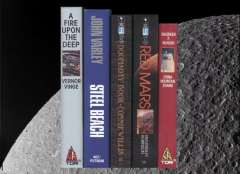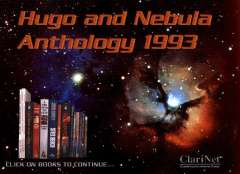
Brad Templeton Home
Brad Ideas
(My Blog)
ClariNet
eBook Publishing (Way too far ahead of the curve)
(A sidebar to the history of ClariNet.)
Not content to just build the first internet newspaper, I turned my attention to a longer-term vision of online book publishing and a search for a general way to sell content in 1992 and 1993.
The first project was at least a decade too early. I knew that Science Fiction would be the ideal type of electronic book to sell to the computer savvy internet audience. At the same time, I didn't think people would (especially then) plunk down money to download books and stories unless they were very special.
Instead I tried to build a system I called the "Library of Tomorrow" around the theme "All you can read for $5/month." I convinced 50 famous science fiction authors to agree to put their stories in the library. Readers would read as much as they wanted, and we would measure what was download, and divide up the royalties according to who was most popular. This is similar to the way in which royalties are paid to songwriters from fees collected from radio stations and music halls.
At the time, many people expressed the mantra that "Information wants to be free" and wondered how you would get people to pay for online content or books. I had done that with ClariNet by not selling single stories (which services like Dialog did for dollars each) but instead selling an entire service, and selling it to an entire site (company, department or institution).
I went around saying, "Information wants to be $5." That always got a laugh. I had learned that when people paid a flat monthly fee for something (be it local phone service or online services) they thought of it as "free" to use, even though they were paying. I speculated that if people would join the Library of Tomorrow, they would think of the books as free, but in fact the authors would be getting paid.
I worked hard to see if I could extend that concept to other media. I knew it would work for movies and music, but the bandwidth of the net was not yet large enough to support those. I tried to find a way to make it work for software but could not find a fair way to distribute the money. At the time I was not able to predict how well the open source model would produce great software without paying most of the writers, at least in dollars.
The Library of Tomorrow was interesting, but I decided to do a more traditional test case. Each year, two SF societies issue awards for the best SF of the year. One is the Hugo award, which is voted on by fans, and the other is the Nebula award, voted on by writers. In 1992, as an experiment, I had convinced the 5 nominees for best short story to release their stories free on the internet. I would conduct a 2nd award for them called the Electric Science Fiction award.
The network was new enough that I was able to get them to agree. It was popular and many people downloaded the stories. They were short, and easy to download, and not hard to read on a computer.
In 1993, I went much grander to test the online book concept. When the nominees for the 1993 Hugo awards were announced, I set out to see if I could get them all into a non-free electronic anthology. Fans who would vote on the award would be able, for the first time, to get them all in one place, to read before voting. The voting deadline was about 3 months after the nominees were announced. It turned out I was going to try to publish the largest anthology of current fiction ever built in just a few weeks, from signing the contracts to shipping the content.
I was immediately on the phone to all the writers, sometimes staying up until 6AM Pacific time to reach east coast folks at 9. Most of the writers were keen on the experiment, and agreed to join with no advance or a minimal advance, just a pro-rata share of the royalties.
 |
| Choose your book |
Then something crazy happened. I spoke with Patrick Nielsen-Hayden, editor at Tor Books. I had planned to do only the short fiction Hugo nominees -- 5 short stories, 5 novelettes and 5 novellas. Tor owned the rights to two of the novel nominees, China Mountain Zhang by Maureen McHugh and most interestingly A Fire Upon the Deep by Vernor Vinge. A Fire Upon the Deep (which would win a rare tied Hugo) is one of the most important SF and computer novels ever written, and I was deeply interested in it. It features a galactic computer net like USENET, and would be very attractive to my audience. On top of all that, the author had made careful notes about all of his writing process while writing the book, and embedded them in his manuscript. I would be able to produce a hypertext version that linked each paragraph in the book to notes about what the author was thinking as he wrote and edited it.
This was too good to pass up. The novels were already in electronic form, since keying them in would have been too expensive and time consuming. (Some of the stories had to be entered with OCR and proofreading from author manuscripts or published copies.) But having just 2 novels was incomplete. As a voter's anthology I had to have them all. So I worked to sign the other 3 novels, and did. Curiously, only one novel had the author own the electronic rights. Steel Beach by John Varley, had been contracted 10 years before, but he had taken a long time to write it. Thus he had an old contract, reserving unknown rights to him. By 1992, publishers were asking for electronic rights in their contracts, even though nobody quite knew what they meant.
I then added all the Nebula Award short fiction to the mix, though that award had been announced. This was crazy. We had to take all this fiction from author manuscripts and do everything that would be needed to typeset it, plus all the work to develop a multimedia presentation for Windows, the Mac and open platforms. And all in 6 weeks. All staff took drafts home for proofreading, and local friends and fans were called in to copy edit.
 |
| Opening screen of eBook anthology |
I produced an online version but also a CD-ROM. It was called simply the Hugo and Nebula Anthology 1993. At the time, Multimedia CD-Roms were the hot thing, and my girlfriend, Harriett Hardman, wanted to build a multimedia consulting business. She agreed to do the CD-ROM production as a demonstration of what her company could do. We really shouldn't have tried to do the Mac as well, and ended up having to spend a lot of time on menus and graphics using the primitive tools of the day.
One system I decided not to use was HTML. It was too young. As part of my electronic book efforts, I went to an eBook conference in Pittsburgh earlier that year. With only about 40 people, it was intimate, and I got to meet a man who would change the world, Tim Berners-Lee. He showed off his new concept of the Web, and was excited about the beta he had of Mosaic, a graphical browser. But it wasn't quite ready yet. Adobe was pushing their new PDF format (thinking at the time they could charge for the reader, which took them out of consideration for me) and O'Reilly had their own browser named Viola. In the end, the only tool able to do a large project was Microsoft's, which we used though it was a pain.
We released the CD and the online edition. The CD did decently, selling about 1500 copies and breaking even (not counting my overwork) but sales of the online version were dreadful. Perhaps a dozen folks paid to download it.
The world was not ready for downloading online books, no-way no-how. Not even top-notch, award winners. As one of the first big eBook projects, and surely the largest one using current (as opposed to classic) fiction, the disk became a bit of a collector's item. I must admit I am pleased when I see them show up on eBay and fetch as much as $300 -- ten times my list price. Part of that owes to the hypertext version of A Fire Upon the Deep, which as noted, became recognized as one of the most important SF novels of the era.
Tim O'Reilly deserves a special mention here, and not just for the early Viola browser his company developed. Tim is primarily a book publisher, with the best line of technical books in the unix, linux and internet space. However, he was also keen on internet publishing and started GNN (Global Network Navigator) as the web was dawning. It was the first serious commercial web site, with a plan to be advertising supported. He sold it to AOL for a good price at the time. If your definition of the first dot-com depends on it being HTML based, O'Reilly and Associates and GNN.com may well merit the title.